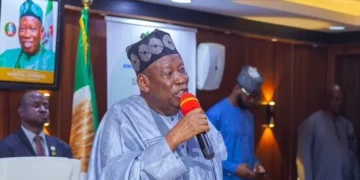The director of research at Savannah Centre for Diplomacy, Democracy and Development, Colonel Abdulwahab Lawal, has bemoaned the lack of internal democracy within the nation’s political parties.
Lawal, a grassroot politician and chairman, Kwara Education Trust Fund, said the lack of internal democracy amongst the political parties is brewing dictatorship in the country.
In an exclusive interview with LEADERSHIP in Ilorin, Kwara State, Lawal maintained that, ” lack of democratic culture in parties is an aberration to democracy itself”.
He described the nation’s form of democracy as ‘hybrid’ with the fusion of dictatorship.
He said democracy as a form of government remains the best option for Nigeria as it fosters inclusiveness, advising Nigerian leaders against straying into dictatorship.
“Democracy itself simply means inclusion, where whatever affects you, you must be consulted in the decision making, you must be carried along, not a system where decisions are imposed on people.
“But in our country, I think our variant is more of hybridity, hybrid democracy. Democracy in a way that there is too much dictatorship in it.
“Our political parties should be managed in a democratic manner. But as it is today, even our political parties are not very democratic. They are dictatorial, and it is an aberration to democracy.
“When we talk about real democracy, it must be free and there must be no imposition and you must engage in good governance, and this simply refers to transparency, openness, integrity, accountability, the rule of law,” he said.
Lawal said the lingering insurgency in parts of the country could be defeated through the optimisation of good governance rather than force.
He urged the government to prioritize providing the basic needs of the people which include food security, stressing that the application of force only cannot end insecurity in the country.
“The armed forces, the police, and security agencies, name it. They can apply force, weapons, and all the rest of it. That is the kinetic aspect of it.
“The non-kinetic aspect that comes with good governance is another aspect. For example, we always say that a hungry man is an angry man. If he has access to guns as is free flowing in our society now, he is hungry and he is angry, how do you subdue such a person? You subdue him by providing him with food.
“You feed him, give him employment. Let him be human, let him feel proud of himself and let him know that this government sees him as a human being with integrity.
“So, the approach to security is both kinetic and non-kinetic. The non-kinetic aspect should be overwhelming and outweighing, and that is why in security, there is what we call a ‘whole of a society’ approach to security.
“This means me and you can contribute to solving security problems if we do things right and these are some of the things that we think we should be doing”. Family role in security is crucial. We must mentor and model our family well and this impacts on the larger society,” Lawal added.
We’ve got the edge. Get real-time reports, breaking scoops, and exclusive angles delivered straight to your phone. Don’t settle for stale news. Join LEADERSHIP NEWS on WhatsApp for 24/7 updates →
Join Our WhatsApp Channel










